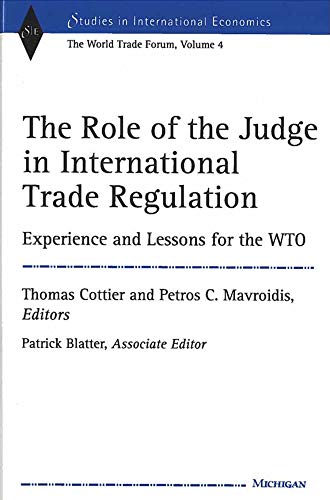The Role of the Judge: Lessons for the Wto - Couverture rigide

L'édition de cet ISBN n'est malheureusement plus disponible.
Afficher les exemplaires de cette édition ISBNLes informations fournies dans la section « Synopsis » peuvent faire référence à une autre édition de ce titre.
- ÉditeurThe University of Michigan Press
- Date d'édition2003
- ISBN 10 0472113194
- ISBN 13 9780472113194
- ReliureRelié
- Nombre de pages376
Acheter neuf
En savoir plus sur cette édition
Frais de port :
EUR 3,74
Vers Etats-Unis
Meilleurs résultats de recherche sur AbeBooks
The Role of the Judge in International Trade Regulation Format: Hardcover
Description du livre Etat : New. Brand New. N° de réf. du vendeur 0472113194
The Role of the Judge in International Trade Regulation (Hardcover)
Description du livre Hardcover. Etat : new. Hardcover. The WTO is generally seen as a key actor of globalization and, as such, has been the point of convergence of popular irritation worldwide. Many of the reproaches addressed to the WTO show civil societys concern with what is perceived as a democratic deficit in the way the organization operates. The main fear is to see trade rise as the ultimate value, prevailing over concerns such as health and environment. The Role of the Judge offers insight into how disputes are solved at the WTO level, into how the judicial branch interacts with the rest of the organization, and into the degree of sensitivity of the system to external input. The book sheds light on the judicial system governing the WTO and shows it to be the only truly multilateral system where disputes are solved by third-party adjudication.The book develops along three lines: the first a search for cases submitted to the WTO where the judge exceeded its authority; the second a comparison of the WTO with the operations of national judicial systems having different levels of integration, specifically the United States (federal level) and the EC (quasi-federal level); and the third an exploration of directions for the future of dispute settlement in the WTO.Reflecting the diversity of its contributors, this book addresses questions of economics, political science, and law, bringing an unusual level of multidisciplinarity to this topic and context. It is designed for both academic readers and practitioners, who will find it full of practical insights as well as rich and detailed analysis.Thomas Cottier is Professor of European and International Economic Law, University of Bern, and Managing Director, World Trade Institute, University of Bern.Petros C. Mavroidis is Professor of Law, University of Neuchatel. He formerly worked in the Legal Affairs Division of the World Trade Organization.Patrick Blatter is Mavroidiss scientific collaborator. The WTO is generally seen as a key actor of globalization and, as such, has been the point of convergence of popular irritation worldwide. Many of the reproaches addressed to the WTO show civil societys concern with what is perceived as a democratic deficit in the way the organization operates. The main fear is to see trade rise as the ultimate value, prevailing over concerns such as health and environment. "The Role of the Judge" offers insight into how disputes are solved at the WTO level, into how the judicial branch interacts with the rest of the organization, and into the degree of sensitivity of the system to external input. The book sheds light on the judicial system governing the WTO and shows it to be the only truly multilateral system where disputes are solved by third-party adjudication. The book develops along three lines: the first a search for cases submitted to the WTO where the judge exceeded its authority; the second a comparison of the WTO with the operations of national judicial systems having different levels of integration, specifically the United States (federal level) and the EC (quasi-federal level); and the third an exploration of directions for the future of dispute settlement in the WTO. Reflecting the diversity of its contributors, this book addresses questions of economics, political science, and law, bringing an unusual level of multidisciplinarity to this topic and context. It is designed for both academic readers and practitioners, who will find it full of practical insights as well as rich and detailed analysis. Thomas Cottier is Professor of European and International Economic Law, University of Bern, and Managing Director, World TradeInstitute, University of Bern. Petros C. Mavroidis is Professor of Law, University of Neuchatel. He formerly worked in the Legal Affairs Division of the World Trade Organization. Patrick Blatter is Mavroidiss Shipping may be from our UK warehouse or from our Australian or US warehouses, depending on stock availability. N° de réf. du vendeur 9780472113194

